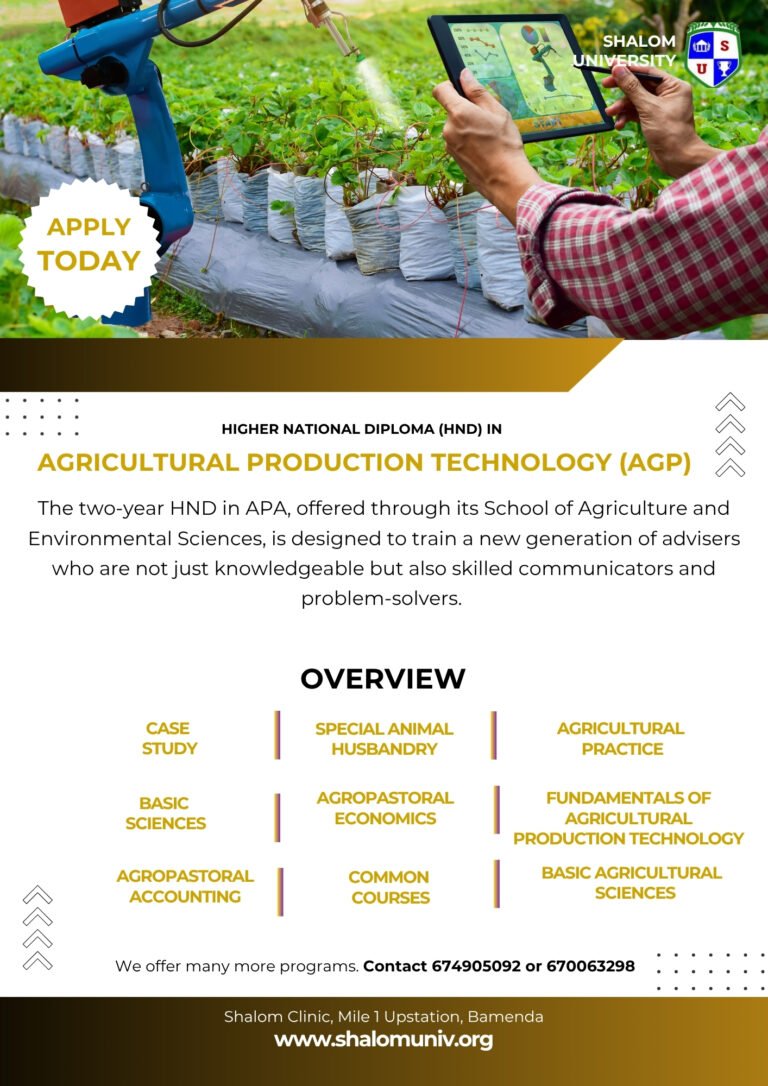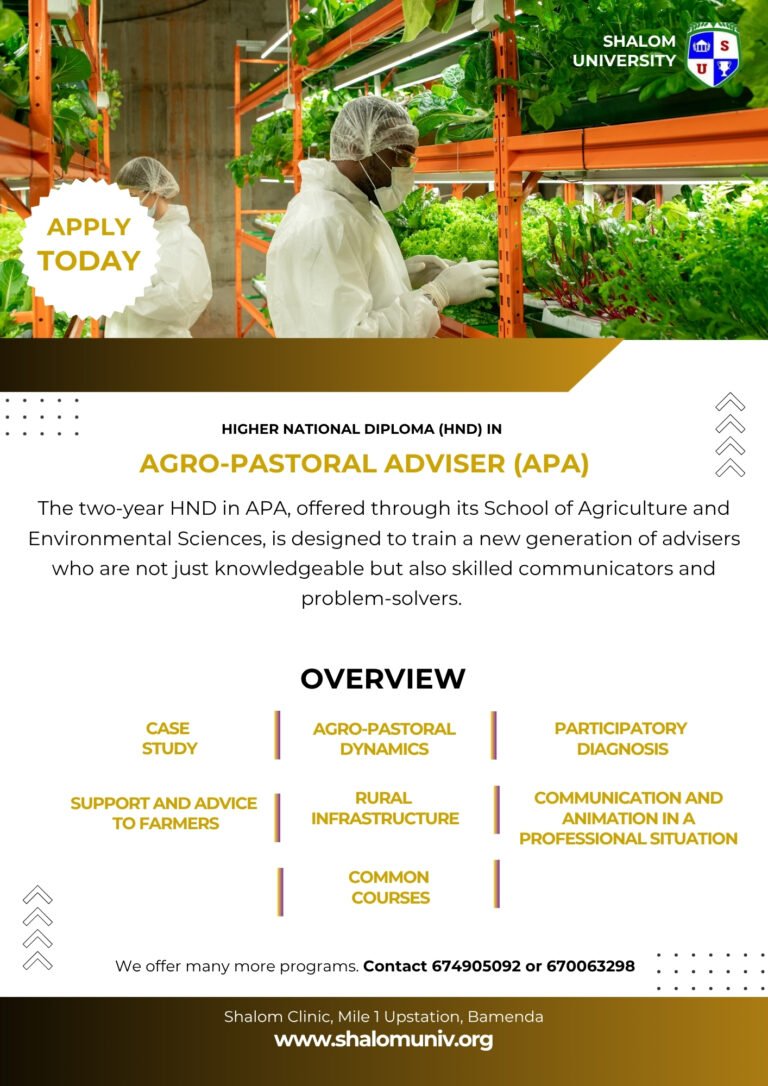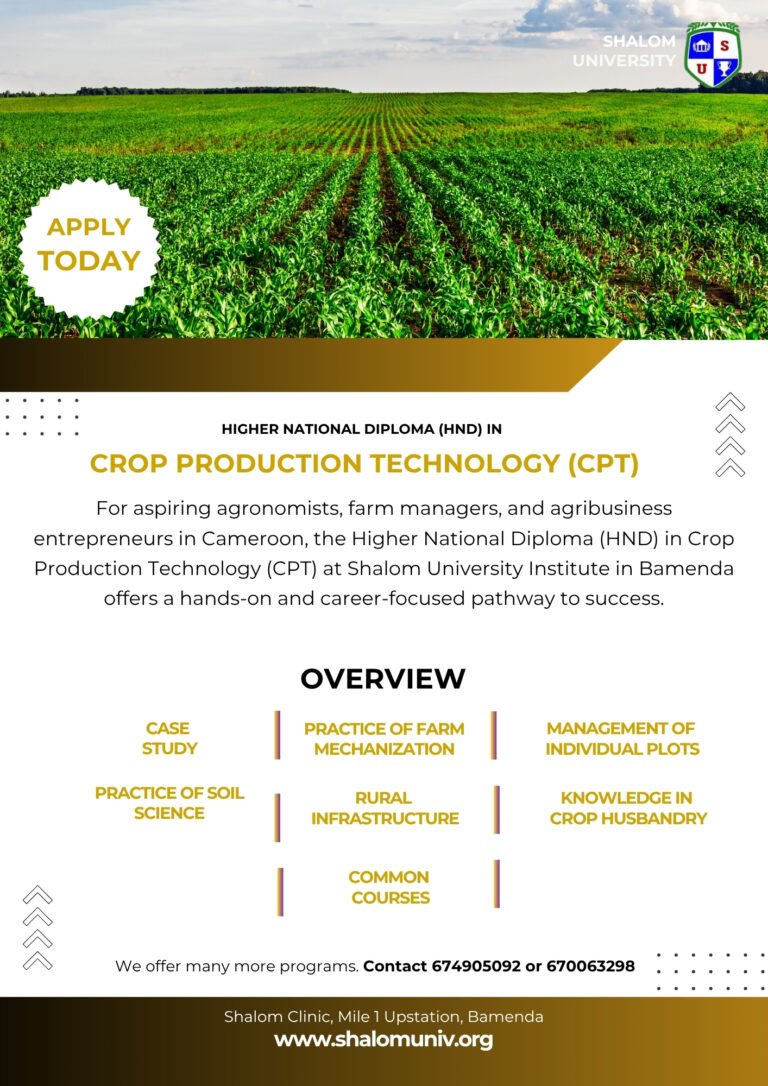In Cameroon, the agricultural sector is the backbone of the economy, and within it, animal production plays a crucial role in providing food security, generating income, and supporting rural livelihoods. From poultry and piggery to cattle and small ruminants, effective animal production is essential for meeting the growing demand for protein and contributing to national development. The HND in Animal Production Technology (APT) at Shalom University in Bamenda is specifically designed to train the next generation of animal husbandry experts who can manage, innovate, and optimize animal production systems.
The curriculum at Shalom University is tailored to the Cameroonian context, blending core animal science principles with hands-on training in farm management, mechanization, soil science, and rural infrastructure. Graduates are prepared not only to work on existing farms but also to establish and manage their own animal production enterprises, contributing to sustainable agriculture and entrepreneurial growth.
The APT Curriculum at Shalom University
The HND in Animal Production Technology program at Shalom University is structured around a set of core papers that provide a comprehensive and practical education in the field.
Paper: Case Study
The Case Study paper is a vital component that integrates all the theoretical knowledge and practical skills gained throughout the program. It challenges students to analyze complex scenarios within the animal production industry, from managing a disease outbreak on a poultry farm to developing a business plan for a new piggery. This is particularly relevant for animal production technologists in Cameroon, who must navigate local challenges related to climate, feed availability, and market access.
The course trains students to:
- Analyze real-world animal production challenges: Based on a given case, students evaluate operational bottlenecks, health issues, or management inefficiencies faced by a farm in Cameroon.
- Identify critical issues and underlying causes: They pinpoint specific problems related to animal nutrition, disease control, housing, or market access and explore the underlying factors.
- Propose evidence-based solutions: Students formulate practical recommendations based on animal husbandry principles, veterinary practices, and management techniques. For example, a case study might involve a cattle farm facing low milk yield and propose a new feeding regimen or a herd health management plan.
- Defend their decisions: During formal presentations, students must justify their analysis and proposed solutions, demonstrating their critical thinking and communication skills, which are essential for effective farm management and stakeholder collaboration.
Paper: Management of Individual Farms
This paper focuses on the business and administrative aspects of running an animal production enterprise. It provides students with the managerial skills needed to make sound decisions, manage resources effectively, and ensure the profitability of their farms.
Key topics include:
- Farm Business Planning: Developing comprehensive business plans for different types of animal production, including financial projections, marketing strategies, and operational plans.
- Resource Management: Managing farm resources, including land, feed, water, and labor, efficiently and sustainably.
- Record Keeping and Financial Management: Implementing effective record-keeping systems for production data, financial transactions, and inventory.
- Marketing and Sales: Strategies for marketing and selling animal products (e.g., meat, milk, eggs) in local markets and to commercial buyers in Cameroon.
Paper: Practice of Farm Mechanization
In modern agriculture, mechanization is key to improving efficiency, productivity, and profitability. This paper provides students with the practical skills needed to operate and maintain farm machinery and equipment used in animal production.
The curriculum covers:
- Tractor and Implement Operation: Hands-on training with tractors and their various implements, such as plows, harrows, and trailers.
- Feeding Systems: The use of automated feeding systems and machinery for preparing and distributing feed.
- Milking Equipment: Operation and maintenance of milking machines for dairy farms.
- Basic Maintenance and Repair: Skills for performing basic maintenance and repair on farm machinery to minimize downtime and costs.
Paper: Practice of Soil Science
While focused on animal production, understanding soil science is crucial for managing pastures, growing feed crops, and managing waste effectively. This paper provides students with a foundational knowledge of soil composition, fertility, and management techniques.
Key areas of focus include:
- Soil Composition and Fertility: Understanding the different types of soil in Cameroon and their fertility, which affects the growth of fodder crops.
- Pasture Management: Techniques for managing pastures for grazing animals, including rotation, fertilization, and weed control.
- Manure and Waste Management: Methods for managing animal manure and waste to improve soil fertility and minimize environmental pollution.
Paper: Rural Infrastructure
This paper focuses on the planning, construction, and maintenance of the essential infrastructure required for animal production in rural settings. This is particularly relevant for students in Cameroon, where infrastructure development can be a significant challenge.
The curriculum covers:
- Housing and Enclosures: Designing and constructing appropriate housing and enclosures for different types of animals, considering local climate and animal welfare.
- Water Supply Systems: Planning and implementing water supply systems for farms, including wells, boreholes, and storage tanks.
- Fencing: Construction and maintenance of different types of fences for enclosing animals and protecting crops.
- Farm Roads: Basic principles of constructing and maintaining farm roads for transport and access.
Paper: Knowledge in Animal Husbandry
This paper provides students with the core theoretical and practical knowledge of animal husbandry, covering the breeding, nutrition, health, and welfare of different livestock species.
Key topics include:
- Animal Nutrition and Feed Formulation: Understanding the nutritional requirements of different animals and how to formulate cost-effective and balanced feed rations using locally available feedstuffs.
- Animal Health and Disease Management: Principles of animal health, common diseases affecting livestock in Cameroon, and methods for disease prevention, diagnosis, and treatment.
- Breeding and Reproduction: Techniques for improving animal genetics and managing breeding programs for optimal productivity.
- Animal Welfare: Principles of animal welfare and ethical handling practices.
- Species-Specific Husbandry: Detailed knowledge of the husbandry practices for specific animal species, such as poultry, pigs, cattle, goats, and sheep.
Fostering Growth in Cameroon’s Agriculture
Graduates of the HND in Animal Production Technology from Shalom University are well-prepared to contribute significantly to Cameroon’s agricultural sector. They can find opportunities as farm managers, animal health technicians, extension agents, or establish their own animal production enterprises. Their proficiency in farm management, mechanization, soil science, and animal husbandry, coupled with an understanding of the local context, makes them highly sought-after candidates. The Case Study paper ensures that they are not just technically skilled but also adept at applying their knowledge to solve real-world challenges in animal production. By providing a comprehensive and contextually relevant education, Shalom University plays a significant role in nurturing the expertise crucial for driving sustainable animal production, ensuring food security, and supporting rural livelihoods in Cameroon.




